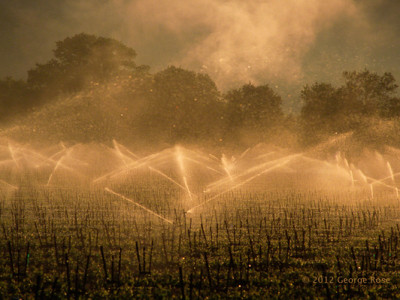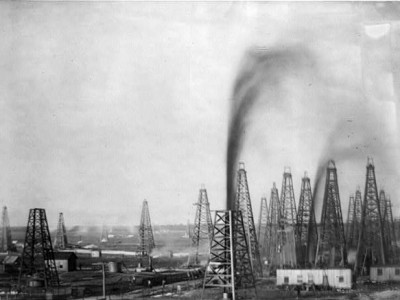Not nonsensical at all
The main State Capitol columnist for the Sacramento Bee wrote a piece today on whether California should encourage or discourage additional oil development in the state. This has been a major debate politically, with Governor Brown resisting calls by many environmental groups to ban fracking. Brown has noted the potential economic benefits from tapping into the possibly huge oil reserves in California that could be unlocked with various advanced oil and gas recovery tech...
CONTINUE READINGA summer course for foreign lawyers interested in US environmental law
This summer Berkeley Law is providing an exciting opportunity for lawyers around the world who are interested in learning more about US environmental law. Our seventeen-day course in late June and early July provides a thorough grounding in all the major issues in US environmental law (ranging from air pollution to natural resources, water rights to environmental justice). The course will be taught by the excellent teachers and scholars here at Berkeley using a ranging o...
CONTINUE READINGWhat’s in a Name?
Supreme Court arguments surround the policies and effects of limitations periods
A few weeks back, I posted about CTS Corp. v. Waldburger, a case then awaiting oral argument in the Supreme Court. As you may recall (or as you can read here, with links to relevant documents), Waldburger involves hazardous waste contamination, and a provision of the Comprehensive Environmental Response, Compensation, and Liability Act (CERCLA) that may or may not allow certain plaintiffs to bring private tort claims for latent injuries. The UCLA Wells Environmenta...
CONTINUE READINGTurning Water Into Wine: An “Unreasonable Use” of Water in California?
Pending Litigation Likely to Affect Scope of California Constitution's Ban on Waste & Unreasonable Use of Water
Today a California appellate court in San Francisco heard arguments in a case that is likely to affect how broadly--or narrowly--California's State Water Resources Control Board can apply the state's most powerful water law. The case, Light v. California State Water Resources Control Board, involves a challenge by wine grape growers in the Russian River watershed of Northern California to a SWRCB rule limiting growers' ability to divert water from the Russian Riv...
CONTINUE READINGQuantifying Environmental Justice (& Injustice) in California–An Update
California Improves an Already-Powerful Environmental Justice Analytical Tool
A year ago, I wrote about an important environmental justice initiative pioneered by the California Environmental Protection Agency and its subsidiary entity, the Office of Environmental Health Hazard Assessment. That 2013 initiative, titled CalEnviroScreen, divided up the State of California by zip code, applied 11 environmental health and pollution factors, assessed each of the state's zip code areas, and ranked each of them in order to evaluate their relative environm...
CONTINUE READINGRichard Lazarus Formally Notified the Supreme Court of Scalia’s Error
Letter Led to Change in Dissenting Opinion
Who knew that the U.S. Supreme Court has a formal process for notifying it about errors in Court opinions? Richard Lazarus, the Howard and Katherine Aibel Professor of Law at Harvard and Supreme Court expert extraordinaire, that's who. Turns out that after he discovered Justice Scalia's error about Whitman v. American Trucking (see my earlier post of this morning), Lazarus invoked the Court's formal rules and procedures and wrote it a letter pointing out the mistake....
CONTINUE READINGDan Farber Highlights Scalia Error in Homer Dissent, Dissent Gets Corrected
Legal Planet post noted error yesterday
Yesterday Dan pointed out that Justice Scalia had made a "cringeworthy" error in his dissenting opinion in EPA v. Homer. Scalia argued -- in support of his claim that EPA's interpretation of the provision of the Clean Air Act that governs cross-state air pollution was inconsistent with the plain language of the statute -- that EPA was inappropriately attempting to smuggle consideration of cost-benefit analysis into its regulation. He then claimed that EPA had previo...
CONTINUE READINGEnding Corporate Welfare for Oil
"There Will Be Blood" was the title of 2007 movie about an old-time oilman. If you were doing a similar movie about the situation today, you might call it, "There Will Be Tax Write-Offs." The taxpayers have been generous to the industry. Oil companies get about $5 billion per year in favored tax treatment. Mostly, these provisions allow oil companies to write off costs faster than normal businesses. The depletion allowance can actually allow a company to write off...
CONTINUE READINGMore About EPA’s Victory
The Court sensibly upheld EPA's method of allocating responsibility between states, while Scalia wrote an unusually sloppy dissent.
As Ann has just written the Supreme Court's decision today in the EME Homer case was a big victory for EPA and for air pollution control. In an opinion by Justice Ginsburg, the Court upheld EPA's interstate transport rule. Ann focused on the potential implications of the decision for the other big environmental case pending before the Court, which deals with greenhouse gases. I'd like to add a little more about the case itself. Although I think the dissenters w...
CONTINUE READINGBreaking News: Supreme Court’s Decision Upholding Cross-State Air Rule Is Good Sign for Greenhouse Gas Rules
Huge victory for EPA in regulating air pollution that crosses state lines
The Supreme Court's 6-2 decision issued this morning in EPA v. EME Homer, upholding the agency's rule to control air pollution that crosses state boundaries, gives plenty of reason for optimism that the Court will also uphold EPA's greenhouse gas rules at issue in a different case, Utility Air Regulator Group v. EPA. Both cases involve very complex regulatory schemes EPA developed under separate provisions of the Clean Air Act. At stake in today's case is how t...
CONTINUE READING










